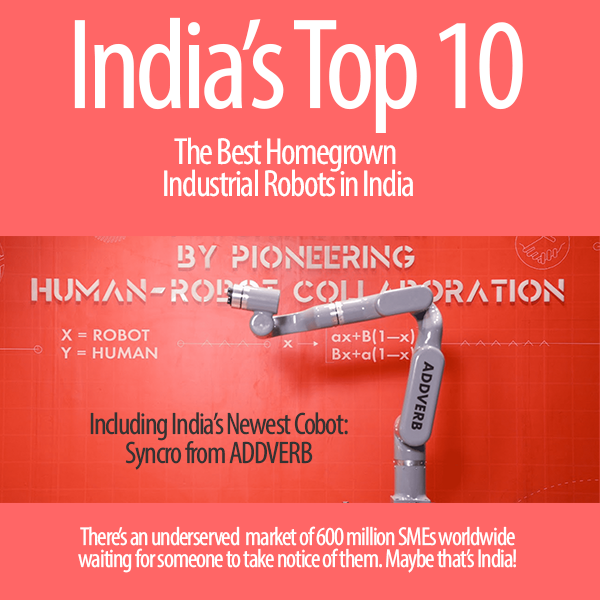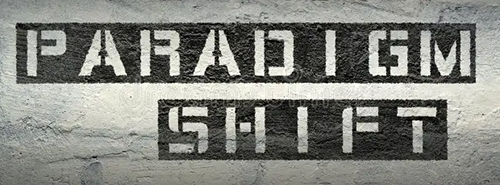
PARADIGM SHIFT:
India's Top 10 Best
Industrial Robot Builders
Paradigm Shift in India's Arm Industry
Gokul NA (co-founder and CTO of CynLr Robotics) explains the new paradigm
These Top 10 Indian robotics companies are driving a new paradigm change in worldwide manufacturing and logistics. India’s long-revered excellence in mathematics and software is suddenly converging with new-age hardware, AI, and automation technology.
Collectively, these 10 industrial robotics companies are driving the New Paradigm Shift in automation and technological advancement in India…and worldwide! They enable businesses to improve efficiency, reduce costs, enhance product quality, and address societal challenges, ultimately driving economic development and industrial progress in the country.
Each plays a significant role in driving technological advancement, automation, and productivity in various industries.
Here’s a description of each of these companies and its contributions:
India's Top 10 Best Industrial Robot Builders
ADDVERB is a leading robotics company in India, specializing in providing automation solutions for warehouses and distribution centers.
Now, with the addition of its own cobot, Syncro, ADDVERB may well have created an entre into the burgeoning world of SMEs…600 million strong worldwide and employer to 90% of global workforces. The Noida headquartered robotics giant has the manufacturing chops to push out tens of thousands of cobots, global reach to sell and service Synchro, especially to the underserved SMEs in the Americas, exactly where ADDVERB is looking for a big jump in overall revenue. 77% is the target, according to CEO Sangeet Kumar. Plus, ADDVERB is young, hungry, and energized to prove itself as a cobot force to be reckoned with.
In general, the stars seem to be aligning for ADDVERB’s leadership role in the pan-Indian robotics ecosystem, which bodes well for tech breakouts from other Indian firms.
Here are the most noteworthy:
CynLr Robotics is a company that specializes in the development of collaborative robots or cobots. CynLr designs and builds a visual object intelligence platform that enables industrial robotic arms to see, understand and manipulate any object.
It is striving to make robots smart and intelligent. Cobots are designed to work alongside humans, assisting in tasks that require precision and dexterity.
CynLr Robotics’ cobots are used in industries like automotive, electronics, and healthcare, helping to improve productivity and workplace safety.
DiFACTO Robotics is a robotics and engineering services firm headquartered in Bangalore. It offers automation and robotics-related services. Offline programming, training, robot simulation, design services, and training. DiFACTO also offers automotive BIW weld lines, arc welding lines, and robot-based sealing, foundry, plastic-cutting, and tending systems.
This company’s primary robotics software offerings include Robostudio, Roboguide, and Motosim.
Genrobotics is known for its innovative robotic solutions in the field of sanitation. They have developed the Bandicoot robot, which is used for cleaning sewer lines and eliminating the need for manual scavenging.
Genrobotics’ technology addresses a critical social issue in India and contributes to improving public health and sanitation infrastructure.
GreyOrange is a prominent robotics company that focuses on robotics automation for warehouses and e-commerce fulfillment centers. Their systems employ artificial intelligence (AI) and machine learning algorithms to optimize order fulfillment processes, enabling faster and more efficient operations.
Gridbots specializes in developing robots for inspection, maintenance, and surveillance applications. Their robots are equipped with advanced sensors and imaging technologies, allowing them to perform tasks such as visual inspection of assets, remote monitoring, and data collection in industries such as oil and gas, power, and infrastructure.
See also: Can India Build a Homegrown, Indigenous Robot Industry to Rival China’s?
Hi-Tech Robotics Systemz (now NOVUS Flow) is a leading provider of industrial robotics solutions, particularly in the field of autonomous mobile robots (AMRs).
Their AMRs are used for material transportation, warehouse automation, and logistics operations, enabling increased efficiency and reduced labor dependency.
Systemantics focuses on creating intelligent robotic solutions for industrial automation.
They develop industrial robots capable of handling complex tasks such as pick-and-place operations, machine tending, and assembly line automation.
Systemantics’ robots are designed to enhance manufacturing productivity and improve quality control. See: Cobots made in India.
TAL Manufacturing Solutions, a subsidiary of Tata Motors, specializes in manufacturing industrial robots for various applications.
Their robotic solutions are used in industries like automotive, aerospace, and general manufacturing, contributing to increased productivity, precision, and quality in production processes.
Wipro PARI Robotics, Wipro PARI Robotics is a collaboration between Wipro Ltd and PARI Robotics, offering robotic automation solutions for various industries.
They provide customized automation systems, including robotic arms, vision-guided systems, and integrated solutions for manufacturing, assembly, and material handling processes.
The New Paradigm Shift

A slice of reality that the New Paradigm Shift aims to transform:
“The world has changed leaps and bounds in the last decade. Product life cycles are getting shorter and shorter. Product designs are revised and changed frequently.
“If a manufacturing line cannot handle even minor changes, then it becomes a roadblock in today’s dynamic world. Manufacturers have resigned themselves to relying on manual labor to meet the required flexibility and versatility in manufacturing processes.
“The downside is that this approach is not scalable and has a heavy dependence on the availability of skilled manual labor.
“In the longer run, we are working towards building dynamic neural models of objects. We envision the utility of such technology to be beyond manufacturing and at the juncture of any system that needs to interact with any object.” — Gokul NA
Gokul & Nikhil
Gokul NA, and his partner, Nikhil Ramaswamy, co-founder CynLr Robotics and CEO, CynLr, offer up a mini state-of-robotics-in-India update:
Nikhil Ramaswamy: “Most of today’s AI-based approaches and machine vision technology in robotics rely on predicting the location of an object based on static images, 3D or otherwise.
“The issue in this approach is that the orientation of an object and lighting can significantly change the color and geometrical shape of the object that the camera perceives. The situation is much more complex when we deal with metal objects with mirror finish. Thus, traditional AI methods that rely on color and shape to identify objects are not as universal.
“To truly automate with the required flexibility and reliability, we need robots that can see, understand, and interact with objects the way humans do.
“We build the missing pieces of visual intelligence for robotic arms that make them object-aware. This enables robotic arms to manipulate objects with superior agility – adapting to the varying shapes, orientations, and weights of the object.”
Gokul NA: “The Covid-19 pandemic gave a glimpse of how sensitive our manufacturing ecosystem and infrastructure are to disruptions in manual labor and supply chain.
The pandemic posed important questions to manufacturers who assumed they were automated enough to remain unaffected. Companies discovered that owing to the rigidity of today’s manufacturing automation practices, there is still a large dependency on manual labor.
“The bulk of tasks in manufacturing and individual piece-picking in warehouses are still manual. For example, manual labor is employed for the seemingly simple task of machine tending of CNC machines. Even if a manufacturer were to invest in an expensive customization to automate machine tending, a human being is needed to prepare the structured pallet that a robot can operate on.
Manufacturers have now recognized that flexible automation is the need of the hour to overcome challenges posed by a shortage of manual and skilled labor.


